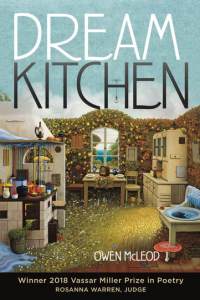In The Field: Conversations With Our Contributors–Owen McLeod
- Tell us about your poem in Volume 21, “Sunrise Village.” How did it come to be?
 It came into being the way most of my poems do: over time, various images lodge themselves in my mind and coalesce into something like a seed. When I feel it sprouting, I try to coax it into a full-grown poem. The germinating images for “Sunrise Village” were sunlit snowmen and geese in flight.
It came into being the way most of my poems do: over time, various images lodge themselves in my mind and coalesce into something like a seed. When I feel it sprouting, I try to coax it into a full-grown poem. The germinating images for “Sunrise Village” were sunlit snowmen and geese in flight.
2. What excites you as a writer? What turns you off, makes you turn away or stop reading a piece of writing?
The act of writing is what most excites me as a writer. As for reading, I try not to be turned off—or, at the very least, to reflect on why something turns me off. Often, I discover that the obstacle isn’t in what I’m reading, but in me – impatience, close-mindedness, jealousy, or whatever.
3. Do you practice any other art forms? If so, do these influence your writing and/or creative process?
I was an experienced potter before I got serious about poetry, and these two art forms turn out to have much common – not only the transformation of amorphous blob into structured object, but also a bunch of lessons: don’t suck the life out of the piece by overworking it; avoid gratuitous ornamentation; listen to the material; pay special attention to beginnings and endings; strive to make something beautiful but also useful; be suspicious of your standards; try to keep your ego out of it. I suspect these lessons apply to almost every art, but I first learned them as a potter.
4. What books, writers, art, or artists inspire you and your work? Do–or have–you had any mentors in your writing life?
For me, there are two sorts of inspiration. One comes from exposure to art, which motivates me to make my own. Lots of artwork inspires me that way. The other is the arrival of an idea, image, or a line – something with content and direction, not merely the blind urge to write. Inspiration of this second sort generally comes not from art, but from what I’ve felt, seen, or heard outside the libraries and galleries.
I don’t have a poetry mentor, probably because I haven’t been through a writing program or even to any writing workshops. But I did get a PhD in philosophy, and my dissertation director taught me how to write philosophy in a style that would be comprehensible to folks outside the discipline. I think this lesson influences my poetry – most of which, I hope, is fairly accessible.
5. What does your creative process look like? How does the environment you are in shape your work  or where do you like to write?
or where do you like to write?
I wish I had a process. Instead, I just wait around, often months, for an idea to show up. That said, my writing environment is important to me. I need to be in my study at home, preferably with no one else in the house, between breakfast and lunch. I’ve tried writing in libraries, cafés, and pubs, but I always feel self-conscious – and I can’t write that way.
Visit Owen’s website, and pre-order his award-winning forthcoming poetry collection “Dream Kitchen” here.

